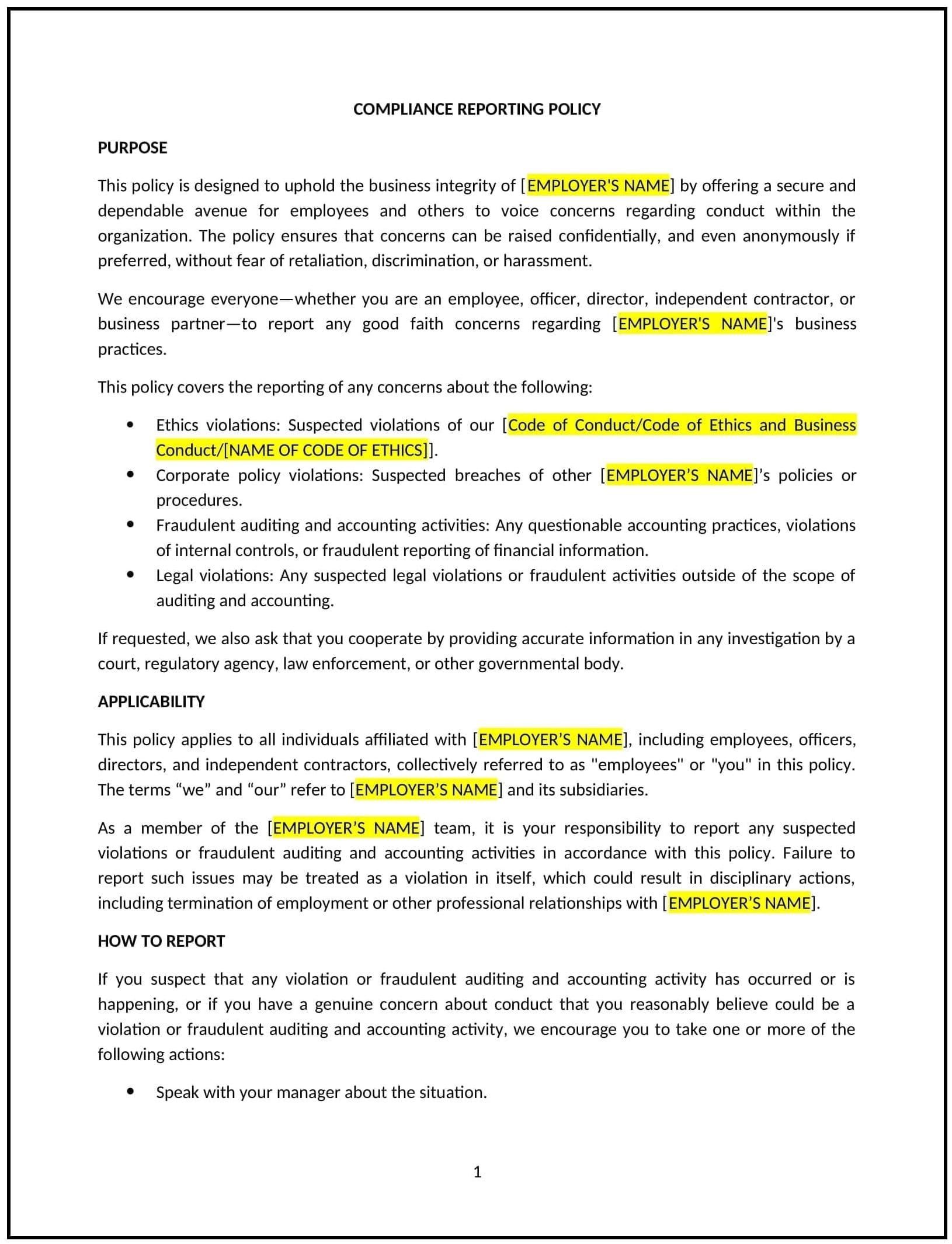Compliance reporting policy (New Mexico): Free template
Got contracts to review? While you're here for policies, let Cobrief make contract review effortless—start your free review now.

Customize this template for free
Compliance reporting policy (New Mexico)
This compliance reporting policy is designed to help New Mexico businesses establish clear procedures for reporting compliance violations and unethical behavior within the company. It outlines the process for employees to report concerns regarding violations of laws, regulations, or company policies and ensures that these reports are handled appropriately and confidentially.
By adopting this policy, New Mexico businesses can create a culture of integrity, ensure compliance with legal and regulatory requirements, and protect the company from legal and reputational risks.
How to use this compliance reporting policy (New Mexico)
- Define reporting mechanisms: Clearly specify how employees can report compliance violations, including the channels available (e.g., email, anonymous hotline, HR, direct supervisor) and who the reports should be directed to.
- Emphasize confidentiality: Ensure employees understand that their identity will be protected during the reporting process, except where required by law or necessary for an investigation.
- Encourage timely reporting: Set clear expectations for the timely reporting of violations, and emphasize that early reporting helps resolve issues before they escalate.
- Address retaliation concerns: Clearly state that retaliation for reporting compliance violations is prohibited and outline the protections in place for employees who come forward with concerns.
- Define the process for handling reports: Establish a structured process for reviewing, investigating, and responding to compliance reports, ensuring that all reports are taken seriously and thoroughly investigated.
- Reflect New Mexico-specific considerations: Incorporate any state-specific laws or regulations that may affect the compliance reporting process in New Mexico, such as state labor laws or industry-specific requirements.
Benefits of using this compliance reporting policy (New Mexico)
Implementing this policy provides New Mexico businesses with several advantages:
- Promotes a culture of integrity: Encourages employees to act ethically and responsibly, knowing they have a safe channel to report any concerns about compliance.
- Reduces legal and reputational risks: By addressing compliance violations promptly, businesses can reduce the risk of legal issues, fines, or reputational damage that can arise from failing to address violations.
- Enhances employee trust: Demonstrating a commitment to ethical behavior and protecting employees who report concerns fosters trust and transparency within the organization.
- Ensures accountability: Provides a clear mechanism for holding individuals accountable for violations of company policies, laws, or regulations.
- Aligns with legal and regulatory requirements: Helps the business comply with both federal and state regulations by providing a formal process for compliance reporting and responding to violations.
Tips for using this compliance reporting policy (New Mexico)
- Communicate the policy clearly: Ensure that all employees are aware of the policy and know how to report compliance issues safely and confidentially. Provide regular reminders about the reporting process.
- Offer multiple reporting channels: Provide employees with several options for reporting violations, including anonymous methods, to ensure that employees feel comfortable coming forward with their concerns.
- Protect employees from retaliation: Reinforce the company’s zero-tolerance stance on retaliation and ensure that employees feel confident reporting without fear of negative consequences.
- Train employees and managers: Offer training on the importance of compliance, how to identify potential violations, and how to report concerns. Managers should also be trained on how to respond to compliance reports.
- Review the policy regularly: Regularly review and update the policy to ensure it remains effective and aligned with New Mexico state laws and any changes in business operations or regulations.